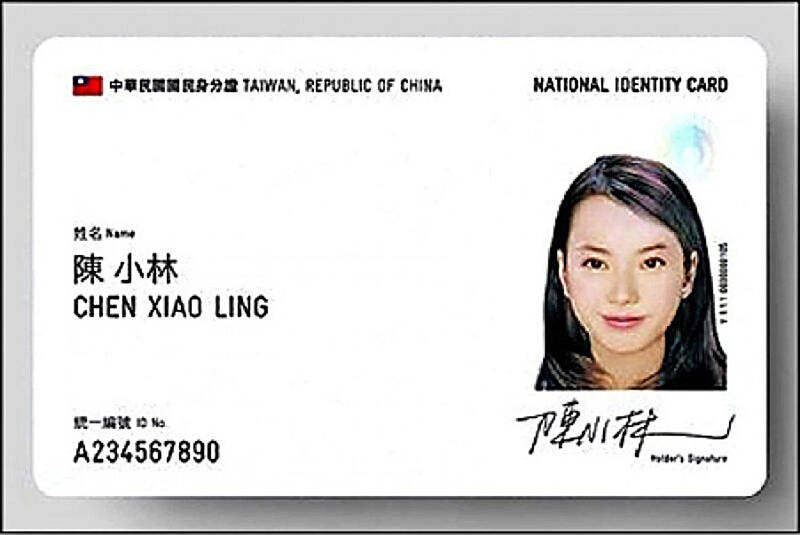The suspended digital identification card program has cost NT$202 million (US$6.27 million) in public spending, as a budget item was renewed semi-annually from January 2021 to December last year, the Central Engraving and Printing Plant said.
Officials from the mint made the comment to lawmakers in the digital ID distribution and budget utilization task force under the Legislative Yuan’s Internal Administration Committee on Wednesday.
In June 2019, the mint began preparations to manufacture digital ID cards containing chips under the Executive Yuan’s directive, aiming to replace existing cards in two years, they said.

Photo: screen grab from the Ministry of the Interior’s Web site
The agency in February 2020 signed a contract with Teco Electric and Machinery Co for card-making equipment, which was delivered in December that year, the mint said.
The factory and equipment were already ready when the Executive Yuan on January 2021 halted the project due to unresolved information security issues, they said.
Teco, which had already supplied the equipment, sued the mint for the income the chip factory would have generated, the mint said, adding that the case was settled out of court.
The settlement stipulated that the government would pay for the project’s overheads, including equipment maintenance and replacement, personnel costs and utility bills, they said.
The building features assembly lines, quality control stations, packaging areas, administrative offices, computer rooms and storage space for semi-finished and finished cards, officials said.
Access-controlled gates and cameras were installed to protect personal data from being leaked and the product’s integrity, they said, adding that personnel would be under full surveillance.
The factory’s internal network is air-gapped and makes use of a point-to-point tunneling protocol to enhance security, they said.

Several Chinese Nationalist Party (KMT) officials including Chairman Eric Chu (朱立倫) are to be summoned for questioning and then transferred to prosecutors for holding an illegal assembly in Taipei last night, the Taipei Police said today. Chu and two others hosted an illegal assembly and are to be requested to explain their actions, the Taipei City Police Department's Zhongzheng (中正) First Precinct said, referring to a protest held after Huang Lu Chin-ju (黃呂錦茹), KMT Taipei's chapter director, and several other KMT staffers were questioned for alleged signature forgery in recall petitions against Democratic Progressive Party (DPP) legislators. Taipei prosecutors had filed

Taiwan would welcome the return of Honduras as a diplomatic ally if its next president decides to make such a move, Minister of Foreign Affairs Lin Chia-lung (林佳龍) said yesterday. “Of course, we would welcome Honduras if they want to restore diplomatic ties with Taiwan after their elections,” Lin said at a meeting of the legislature’s Foreign Affairs and National Defense Committee, when asked to comment on statements made by two of the three Honduran presidential candidates during the presidential campaign in the Central American country. Taiwan is paying close attention to the region as a whole in the wake of a

President William Lai (賴清德) has appointed former vice president Chen Chien-jen (陳建仁) to attend the late Pope Francis’ funeral at the Vatican City on Saturday on his behalf, the Ministry of Foreign Affairs said today. The Holy See announced Francis’ funeral would take place on Saturday at 10am in St Peter’s Square. The ministry expressed condolences over Francis’ passing and said that Chen would represent Taiwan at the funeral and offer condolences in person. Taiwan and the Vatican have a long-standing and close diplomatic relationship, the ministry said. Both sides agreed to have Chen represent Taiwan at the funeral, given his Catholic identity and

Lawmakers from the Democratic Progressive Party (DPP) yesterday established a friendship group with their counterparts in Ukraine to promote parliamentary exchanges between the two countries. A ceremony in Taipei for the Taiwan-Ukraine Parliamentary Friendship Association, initiated by DPP Legislator Chen Kuan-ting (陳冠廷), was attended by lawmakers and officials, including Deputy Minister of Foreign Affairs Francois Wu (吳志中) and European Economic and Trade Office in Taiwan Director Lutz Gullner. The increasingly dire situation in Ukraine is a global concern, and Taiwan cannot turn its back when the latter is in need of help, as the two countries share many common values and interests,